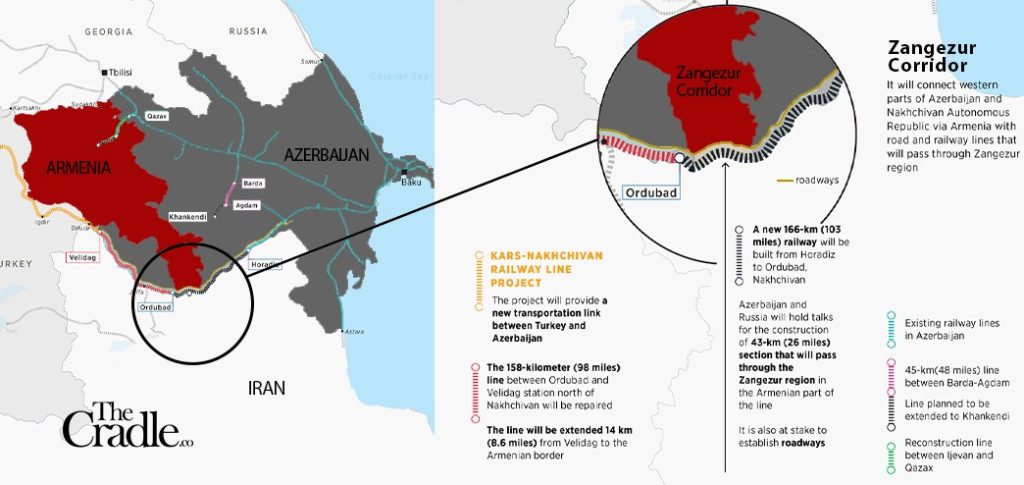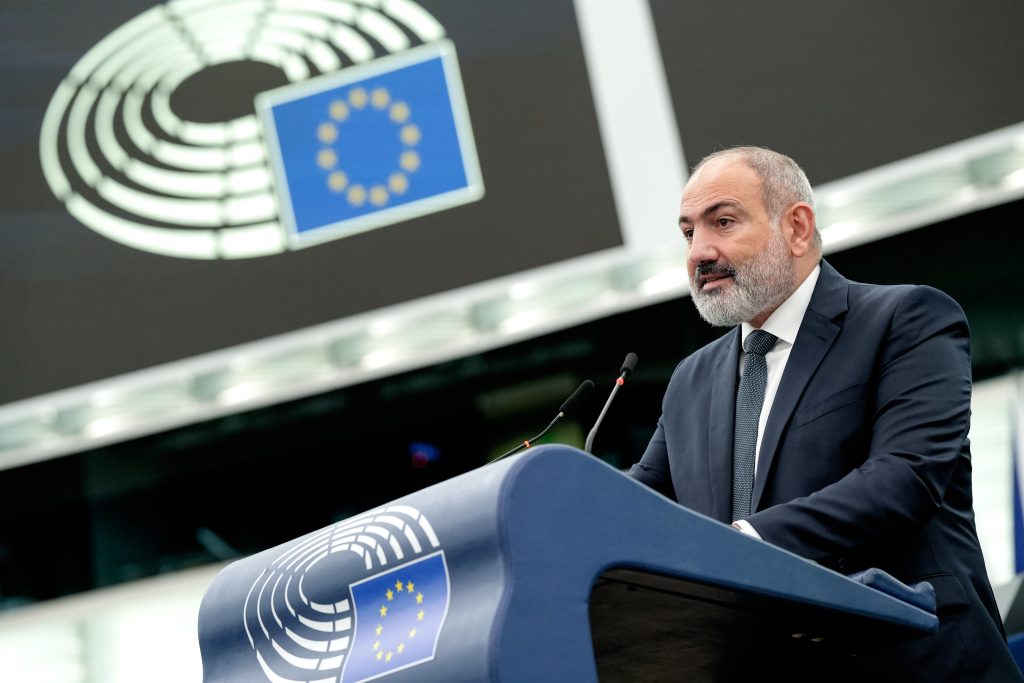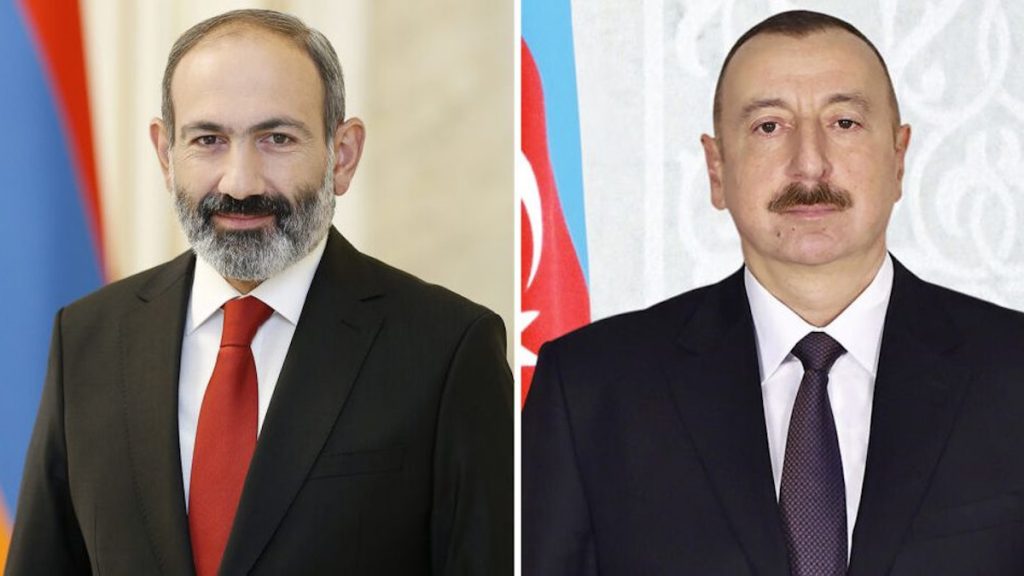While the world remains focused on Israel’s war against Hamas, Azerbaijan and Armenia seek to normalize relations. After Baku resolved the decades-old Nagorno-Karabakh conflict in its favor, the energy-rich South Caucasus nation aims to achieve other significant geopolitical goals, while Yerevan, as a defeated party, seems to attempt to radically change its foreign policy course.
For Azerbaijan, the Karabakh issue is a thing of the past. Baku now seeks to get a land link between mainland Azerbaijan and its exclave of Nakhchivan, and further with Turkey. Ever since Armenia and Azerbaijan signed a Russian-brokered ceasefire agreement in 2020 – a document that effectively ended the 44-day war the two archenemies fought over Nagorno-Karabakh – Baku was pressuring Yerevan to start building its section of the Nakhchivan corridor (also known as the Zangezur Corridor). Since Armenia repeatedly refused to start the construction of a road and a rail road that would go through Armenian southern province of Syunik, fearing that such a project would have an impact on the country’s sovereignty, Baku seems to have changed its plans.
“The project has lost its attractiveness for us — we can do this with Iran instead”, said Hikmet Hajiyev, the foreign policy aide to the President of Azerbaijan. That is why the Islamic Republic sees the Zangezur corridor as a “conspiracy to create NATO’s Turan Corridor”.

According to Azerbaijani top official, Baku’s agenda was “only about building transport linkages and connectivity through the framework of bilateral engagement”. In other words, the energy-rich country seems to have given up on its ambitions to have a land link between mainland Azerbaijan and Turkey via Armenian territory. Initially, the Zangezur corridor – that could become part of the Chinese Belt and Road Initiative – was meant to give Baku unimpeded access to Nakhchivan (and Turkey). But for Iran, the realization of such a project would pose an existential threat. That is why the Islamic Republic sees the Nakhchivan corridor as a “conspiracy to create NATO’s Turan Corridor”. Indeed, if completed, the passport-free route would effectively cut off Iran from Armenia, Yerevan would lose sovereignty over parts of its Syunik province, and Iran would be semi-encircled by Turkic states in the north.
For Tehran, Iran’s 40-mile border with Armenia has become one of the most strategically important pieces of terrain. The Iranian authorities repeatedly stated that Armenia’s territorial integrity is the Islamic Republic’s “red line”, and that Tehran “will not tolerate any changes to the regional borders”. Could that be the reason why Azerbaijan reportedly accepted to have a land link with Nakhchivan through Iran, rather than via southern Armenia?
Although Baku no longer insists on a road and a rail road through Armenia, there are speculations that Azerbaijan could invade the neighboring country. Hikmet Hajiyev, however, insists that Baku has no plans to seize Armenia’s Syunik province, and claims that a peace deal with Yerevan is “within reach”. Armenia, on the other hand, despite being a member of the Russian-dominated Collective Security Treaty Organization (CSTO), has started developing close military cooperation with NATO-member France.
Yerevan now sees Paris, rather than Moscow, as its major partner, as the landlocked country of around three million people seeks to distance itself from Russia and take a pro-Western geopolitical vector. Armenian Prime Minister Nikol Pashinyan said on October 25 that he sees “no advantage in the continued presence of Russian military bases in Armenia”, and that Yerevan is looking for new partners because Moscow “has failed to fulfill its allied commitments”. The fact that he did not participate in the summit of the Russian-led Commonwealth of Independent States (CIS) leaders on October 13 perfectly illustrates that the Kremlin will have a hard time preserving Armenia in Russia’s geopolitical orbit.

If, in the coming weeks or months, Pashinyan and Azerbaijani President Ilham Aliyev sign a peace treaty in any European capital, it will be a clear indication that Moscow has lost its influence in the South Caucasus. It is not a secret that the West and Turkey aim to crowd Russia out of the region, while Armenia, despite a humiliating defeat it suffered in Nagorno-Karabakh, aims to normalize relations with Azerbaijan almost at any cost. The former Soviet republic is even ready to start buying natural gas from its archenemy, and it reportedly hopes to become a transit country for Azerbaijani gas supply to Europe, which means that Yerevan, in the long-term, plans to end its energy dependance on Russia.
One thing is for sure: a tiny landlocked nation will face serious challenges in the months and years to come. Azerbaijan, as a clear war winner, expects Armenia to make unilateral territorial concessions – namely in terms of border delimitation – and Aliyev will undoubtedly have an upper hand in any peace negotiations with Pashinyan.

